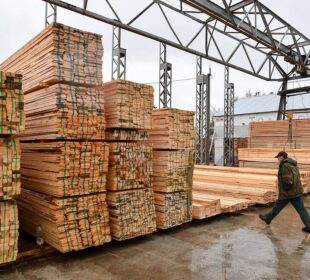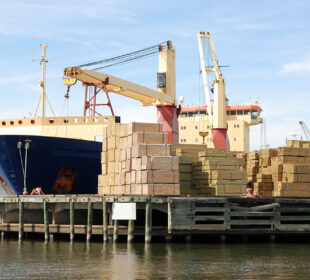An area of uncertainty for importers of wood products into the EU is the status of EUTR enforcement.
Indonesian manufacturers will be expecting to build on and accelerate the relatively slow growth in sales of furniture and other products to the EU in 2015 when the first FLEGT licenses are issued for Indonesian products, now expected in the third quarter of 2016, ITTO reported.
These licenses, issued as one important outcome of the VPA between Indonesia and the EU, will allow Indonesian products to be placed on the EU market without the need for any further due diligence on the part of the importer.
FLEGT licences are expected to greatly simplify and reduce the costs of EUTR conformance for individual EU operators dealing in products from Indonesia. They should also give Indonesian products an edge over competitors from non-VPA countries. However this is heavily dependent on effective enforcement of EUTR by EU authorities.
To date EUTR enforcement activities have been fairly low key, a situation partly explained by the time it has taken for EU Member States to introduce sanction regimes, and to build capacity and experience at national level. EUTR is an innovative and complex regulation and it is perhaps inevitable that there have been teething problems in implementation.
EUTR implementation has been particularly challenging during a period of austerity in the EU which has meant that in some Member States there has been unwillingness to commit resources. Indeed the European Commission was forced in late 2015 to start legal action against four Member States - Hungary, Greece, Romania and Spain – for their failure to introduce the necessary enforcement measures.
Meanwhile other Member States, while introducing the necessary legal frameworks, deliberately introduced a grace period to provide time to build understanding both in government agencies and the timber trade of the practical steps required for effective due diligence, However there are now signs that enforcement agencies in some Member States are moving out of the implementation phase and becoming more determined to take action against operators in breach of the legislation.
According to a recent article by Forest Trends, Sweden and the Netherlands have formally notified two companies that imported wood products from Cameroon and Myanmar—allegedly without undertaking effective Due Diligence—that they may be subject to sanction.
Both these actions, announced almost simultaneously in mid-March, were primarily civil enforcement measures aimed at stopping the marketing of potentially illegal wood. These are not currently criminal cases such as those which have been prosecuted in the United States under the Lacey Act.
However, if the importing companies fail to act within the given timescales, administrative sanctions can be imposed.
The Dutch case has been presented to the public prosecutor as a potential criminal case, with a decision pending.
According to Forest Trends, the Netherlands Food and Consumer Product Safety Authority (NVWA) has issued an injunction notice to Fibois BV Purmerend for importing wood from CTT Ltd, a supplier in Cameroon. If the Dutch company doesn’t stop placing the wood on the market in the Netherlands, it will face a fine.
Drawing on information from the Dutch Timber Trade Federation (VVNH), Forest Trends emphasise that Fibois plans to appeal the government’s action.
In addition, Forest Trends note that the case has been sent to the National Prosecutors’ Office, and could be brought before a judge for a potential criminal law sanction. The NVWA cited the failure of the company to mitigate the “risk of illegal harvesting” inherent in purchasing wood from Cameroon given the “political situation in the Congo Basin.”
In announcing the case, the Dutch Government also noted that its main enforcement focus in the future will be on furniture imports from China, Vietnam, and India.
With respect to the Swedish case, Forest Trends report that this involves imports of teak flooring by a Swedish company called Retlog Ltd. The flooring was processed in Thailand using logs from Myanmar.
The Swedish enforcement agency publicly referenced the high incidence of forest sector corruption in the source country as a key determinant of risk.
This was reinforced by the EUTR Guidance Document Feb 2016 issued by the European Commission in February, which explicitly noted corruption as a criterion for judging risk in an EUTR-compliant Due Diligence System.
Forest Trends observe that the Swedish case is also significant for the involvement of Bureau Veritas in its role as EUTR Monitoring Organisation. Monitoring Organisations are formally recognised by the European Commission as competent to develop and support implementation of due diligence procedures on behalf of groups of operators. They form a key part of the EU’s strategy to ensure EUTR conformance is not too burdensome on small operators in the EU.
Forest Trends suggest that Bureau Veritas considered shipments under 1,000 cubic metres to be of negligible risk. However neither the EUTR legislation nor any guidance have such a threshold, so it is unclear how Bureau Veritas arrived at this assumption.
This raises important questions about where liability lies if a Monitoring Organisation, which is formally endorsed by the EC, promotes due diligence requirements that might be viewed as non-conformant by individual EUTR Competent Authorities.
[gravityform id="1" title="true" description="true"]
[gravityform id="2" title="true" description="true"]















